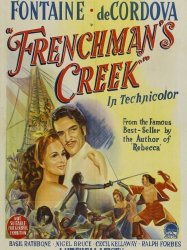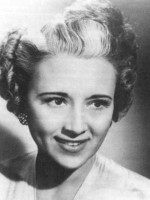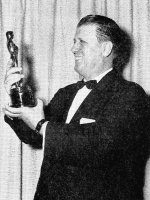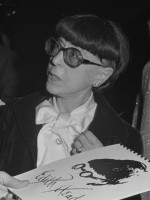Joan Fontaine is a Actor British born on 22 october 1917 at Tokyo (Japon)
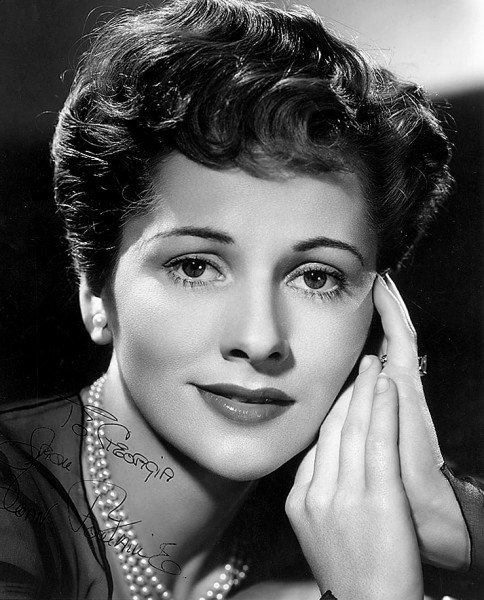
Joan de Beauvoir de Havilland (October 22, 1917 – December 15, 2013), known professionally as Joan Fontaine, was a British-American actress. Fontaine began her career on the stage in 1935 and signed a contract with RKO Pictures that same year.
In 1941, she received an Academy Award nomination for Best Actress for her role in Rebecca, directed by Alfred Hitchcock. The following year, she won the Academy Award for Best Actress for Hitchcock's Suspicion (1941), making Fontaine the only actor to ever win an Academy Award in a film directed by Hitchcock. Fontaine and her elder sister Olivia de Havilland are the only set of siblings to have won lead acting Academy Awards. During the 1940s to the 1990s, Fontaine continued her career in roles on the stage and in radio, television and film. She released her autobiography, No Bed of Roses, in 1978. After a career spanning over fifty years, Fontaine made her last on-screen appearance in 1994.
Born in Japan to British parents, the sisters moved to California in 1919. Fontaine lived in Carmel Highlands, California, where she owned a home, Villa Fontana. It was there that she died of natural causes at the age of 96 in 2013.
Marriages and children
Fontaine was married and divorced four times. Her first marriage was to actor Brian Aherne, in 1939 in Del Monte, California; they divorced in April 1945. In May 1946, she married actor/producer William Dozier in Mexico City. They had a daughter, Deborah Leslie, in 1948 and separated in 1949. The following year, Fontaine filed for divorce, charging Dozier with desertion. Their divorce was finalized in January 1951. Fontaine's third marriage was to producer and writer Collier Young on November 12, 1952. They separated in May 1960, and Fontaine filed for divorce in November 1960. Their divorce was finalized in January 1961. Fontaine's fourth and final marriage was to Sports Illustrated golf editor Alfred Wright, Jr, on January 23, 1964 in Elkton, Maryland; they divorced in 1969.
While in South America for a film festival in 1951, Fontaine met a 4-year-old Peruvian girl named Martita, and informally adopted her. Fontaine met Martita while visiting Incan ruins where Martita's father worked as a caretaker. Martita's parents allowed Fontaine to become Martita's legal guardian in order to give the child a better life. Fontaine promised Martita's parents she would send the girl back to Peru to visit when Martita was 16 years old. When Martita turned 16, Fontaine bought her a round-trip ticket to Peru, but Martita refused to go and opted to run away. Fontaine and Martita became estranged following the incident. While promoting her autobiography in 1978, Fontaine addressed the issue stating, "Until my adopted daughter goes back to see her parents, she's not welcome. I promised her parents. I do not forgive somebody who makes me break my word."
Sibling rivalry
Fontaine and her sister, Olivia de Havilland, are the only set of siblings to have won lead acting Academy Awards. Olivia was the first to become an actress; when Fontaine tried to follow her lead, their mother, who allegedly favored Olivia, refused to let Joan use the family name. Subsequently, Fontaine had to invent a name, taking first Joan Burfield, and later Joan Fontaine. Biographer Charles Higham records that the sisters had an uneasy relationship from early childhood, when Olivia would rip up the clothes Joan had to wear as hand-me-downs, forcing Joan to sew them back together. A large part of the friction between the sisters allegedly stemmed from Fontaine's belief that Olivia was their mother's favorite child.
De Havilland and Fontaine were both nominated for the Academy Award for Best Actress in 1942. Fontaine won for her role in Alfred Hitchcock's Suspicion over de Havilland's performance in Hold Back the Dawn. Higham states that Fontaine "felt guilty about winning given her lack of obsessive career drive...". Higham has described the events of the awards ceremony, stating that as Fontaine stepped forward to collect her award, she pointedly rejected de Havilland's attempts at congratulating her and that de Havilland was both offended and embarrassed by her behavior. Fontaine, however, tells a different story in her autobiography, explaining that she was paralyzed with surprise when she won the Academy Award, and that de Havilland insisted she get up to accept it. "Olivia took the situation very graciously," Fontaine wrote. "I was appalled that I'd won over my sister." Several years later, however, de Havilland apparently remembered what she perceived as a slight and exacted her own revenge by brushing past Fontaine, who was waiting with her hand extended, because de Havilland allegedly took offense at a comment Fontaine had made about de Havilland's husband.
Contrary to press reports, the sisters continued their relationship after the 1940s. After Fontaine's separation from her husband in 1952, de Havilland came to her apartment in New York often, and at least once spent Christmas together there, in 1961. They were photographed laughing together at a party for Marlene Dietrich in 1967. Joan also went to visit Olivia in Paris in 1969.
The sisters reportedly did not completely stop speaking to each other until 1975, after their mother's funeral, to which Joan, who was out of the country, was not invited.
Both sisters largely refused to comment publicly about their relationship. In a 1978 interview, however, Fontaine said of the sibling rivalry, "I married first, won the Oscar before Olivia did, and if I die first, she'll undoubtedly be livid because I beat her to it!" The following year, in a 1979 interview, Fontaine claimed the reason she and her sister stopped speaking to each other was that de Havilland wanted their mother (who was suffering from cancer) to be treated surgically at the advanced age of 88, which Fontaine apparently did not think was a good idea. Fontaine claims that after their mother died, de Haviland did not bother to try to find out where Fontaine could be reached (Fontaine was on tour in a play). Instead, de Havilland sent a telegram, which did not arrive until two weeks later at Fontaine's next stop. According to Fontaine, de Havilland did not invite her to a memorial service for their mother. De Havilland claims she informed Fontaine, but Fontaine brushed her off, claiming she was too busy to attend. Higham records that Fontaine had an estranged relationship with her own daughters as well, possibly because she discovered that they were secretly maintaining a relationship with de Havilland.
Source : Wikidata
Joan Fontaine

Birth name Joan de Beauvoir de Havilland
Nationality United-kingdom
Birth 22 october 1917 at Tokyo (Japon)
Death 15 december 2013 (at 96 years) at Carmel-by-the-Sea (USA)
Awards Academy Award for Best Actress
Nationality United-kingdom
Birth 22 october 1917 at Tokyo (Japon)
Death 15 december 2013 (at 96 years) at Carmel-by-the-Sea (USA)
Awards Academy Award for Best Actress
In 1941, she received an Academy Award nomination for Best Actress for her role in Rebecca, directed by Alfred Hitchcock. The following year, she won the Academy Award for Best Actress for Hitchcock's Suspicion (1941), making Fontaine the only actor to ever win an Academy Award in a film directed by Hitchcock. Fontaine and her elder sister Olivia de Havilland are the only set of siblings to have won lead acting Academy Awards. During the 1940s to the 1990s, Fontaine continued her career in roles on the stage and in radio, television and film. She released her autobiography, No Bed of Roses, in 1978. After a career spanning over fifty years, Fontaine made her last on-screen appearance in 1994.
Born in Japan to British parents, the sisters moved to California in 1919. Fontaine lived in Carmel Highlands, California, where she owned a home, Villa Fontana. It was there that she died of natural causes at the age of 96 in 2013.
Biography
Fontaine held dual citizenship; she was British by birthright (both her parents were British) and became an American citizen in April 1943.Marriages and children
Fontaine was married and divorced four times. Her first marriage was to actor Brian Aherne, in 1939 in Del Monte, California; they divorced in April 1945. In May 1946, she married actor/producer William Dozier in Mexico City. They had a daughter, Deborah Leslie, in 1948 and separated in 1949. The following year, Fontaine filed for divorce, charging Dozier with desertion. Their divorce was finalized in January 1951. Fontaine's third marriage was to producer and writer Collier Young on November 12, 1952. They separated in May 1960, and Fontaine filed for divorce in November 1960. Their divorce was finalized in January 1961. Fontaine's fourth and final marriage was to Sports Illustrated golf editor Alfred Wright, Jr, on January 23, 1964 in Elkton, Maryland; they divorced in 1969.
While in South America for a film festival in 1951, Fontaine met a 4-year-old Peruvian girl named Martita, and informally adopted her. Fontaine met Martita while visiting Incan ruins where Martita's father worked as a caretaker. Martita's parents allowed Fontaine to become Martita's legal guardian in order to give the child a better life. Fontaine promised Martita's parents she would send the girl back to Peru to visit when Martita was 16 years old. When Martita turned 16, Fontaine bought her a round-trip ticket to Peru, but Martita refused to go and opted to run away. Fontaine and Martita became estranged following the incident. While promoting her autobiography in 1978, Fontaine addressed the issue stating, "Until my adopted daughter goes back to see her parents, she's not welcome. I promised her parents. I do not forgive somebody who makes me break my word."
Sibling rivalry
Fontaine and her sister, Olivia de Havilland, are the only set of siblings to have won lead acting Academy Awards. Olivia was the first to become an actress; when Fontaine tried to follow her lead, their mother, who allegedly favored Olivia, refused to let Joan use the family name. Subsequently, Fontaine had to invent a name, taking first Joan Burfield, and later Joan Fontaine. Biographer Charles Higham records that the sisters had an uneasy relationship from early childhood, when Olivia would rip up the clothes Joan had to wear as hand-me-downs, forcing Joan to sew them back together. A large part of the friction between the sisters allegedly stemmed from Fontaine's belief that Olivia was their mother's favorite child.
De Havilland and Fontaine were both nominated for the Academy Award for Best Actress in 1942. Fontaine won for her role in Alfred Hitchcock's Suspicion over de Havilland's performance in Hold Back the Dawn. Higham states that Fontaine "felt guilty about winning given her lack of obsessive career drive...". Higham has described the events of the awards ceremony, stating that as Fontaine stepped forward to collect her award, she pointedly rejected de Havilland's attempts at congratulating her and that de Havilland was both offended and embarrassed by her behavior. Fontaine, however, tells a different story in her autobiography, explaining that she was paralyzed with surprise when she won the Academy Award, and that de Havilland insisted she get up to accept it. "Olivia took the situation very graciously," Fontaine wrote. "I was appalled that I'd won over my sister." Several years later, however, de Havilland apparently remembered what she perceived as a slight and exacted her own revenge by brushing past Fontaine, who was waiting with her hand extended, because de Havilland allegedly took offense at a comment Fontaine had made about de Havilland's husband.
Contrary to press reports, the sisters continued their relationship after the 1940s. After Fontaine's separation from her husband in 1952, de Havilland came to her apartment in New York often, and at least once spent Christmas together there, in 1961. They were photographed laughing together at a party for Marlene Dietrich in 1967. Joan also went to visit Olivia in Paris in 1969.
The sisters reportedly did not completely stop speaking to each other until 1975, after their mother's funeral, to which Joan, who was out of the country, was not invited.
Both sisters largely refused to comment publicly about their relationship. In a 1978 interview, however, Fontaine said of the sibling rivalry, "I married first, won the Oscar before Olivia did, and if I die first, she'll undoubtedly be livid because I beat her to it!" The following year, in a 1979 interview, Fontaine claimed the reason she and her sister stopped speaking to each other was that de Havilland wanted their mother (who was suffering from cancer) to be treated surgically at the advanced age of 88, which Fontaine apparently did not think was a good idea. Fontaine claims that after their mother died, de Haviland did not bother to try to find out where Fontaine could be reached (Fontaine was on tour in a play). Instead, de Havilland sent a telegram, which did not arrive until two weeks later at Fontaine's next stop. According to Fontaine, de Havilland did not invite her to a memorial service for their mother. De Havilland claims she informed Fontaine, but Fontaine brushed her off, claiming she was too busy to attend. Higham records that Fontaine had an estranged relationship with her own daughters as well, possibly because she discovered that they were secretly maintaining a relationship with de Havilland.
Best films
Usually with
Filmography of Joan Fontaine (50 films)
Actress

Dark Mansions (1986)
Directed by Jerry London
Origin USA
Genres Drama
Actors Joan Fontaine, Michael York, Paul Shenar, Melissa Sue Anderson, Lois Chiles, Dan O'Herlihy
Roles Margaret Drake
Rating65%






The Users (1978)
, 2h30Directed by Joseph Hardy
Origin USA
Genres Drama
Themes Films about films, Films about writers, Films about sexuality, Films about television, LGBT-related films, LGBT-related films, LGBT-related film
Actors Jaclyn Smith, Tony Curtis, Red Buttons, Joan Fontaine, John Forsythe, George Hamilton
Roles Grace St. George
Rating61%





Elena Scheider (Smith) is a prostitute with class who is hired by film producer Adam Baker (Hamilton) to seduce Randy Brent (Curtis), an actor who is working in Phoenix on his latest film The Last Man. Since the death of his wife, who committed suicide by overdose seven years ago, Randy has retired from the screen and he is now seen as a has-been. The Last Man is his first venture since the tragedy, but he has trouble shooting the love scenes. Elena successfully seduces him and he soon falls in love with her. It does not take long before she moves in with him in his mansion in Hollywood.

The Witches (1966)
, 1h30Directed by Cyril Frankel
Origin United-kingdom
Genres Drama, Thriller, Fantasy, Horror
Themes Films about magic and magicians, Witches in film
Actors Joan Fontaine, Kay Walsh, Alec McCowen, Leonard Rossiter, Ann Bell, John Collin
Roles Gwen Mayfield
Rating58%





A British schoolteacher, Gwen (Joan Fontaine), travels to Africa to work as a missionary. She has a nervous breakdown after being exposed to witchcraft during a rebellion led by witch doctors. Returning to England to recover, she is hired by wealthy siblings Alan and Stephanie Bax (Alec McCowen and Kay Walsh) to become head teacher of the small private school in their rural village.
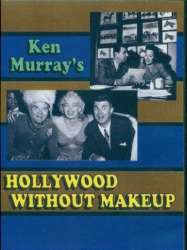
Hollywood Without Make-Up (1963)
Directed by Ken Murray
Origin USA
Genres Documentary
Themes Documentary films about business, Documentary films about the film industry, Documentary films about cities
Actors Kirk Douglas, Ken Murray, Cary Grant, June Allyson, George K. Arthur, Eddie Albert
Roles Self (archive footage)
Rating71%





The film consists of archive footage of famous Hollywood stars, mostly home movies showing the stars as themselves instead of playing a role in front of the camera.
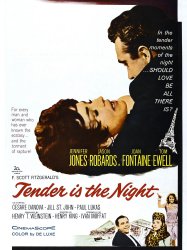
Tender Is the Night (1962)
, 2h22Directed by Henry King
Origin USA
Genres Drama, Romance
Themes Children's films
Actors Jennifer Jones, Jason Robards, Joan Fontaine, Tom Ewell, Cesare Danova, Jill St John
Roles Baby Warren
Rating59%





At a party in the south of France, when she sees her husband, Dr. Dick Diver, take an interest in an American movie starlet, Rosemary Hoyt, jealousy gets the better of Nicole Diver, a woman with many emotional issues.
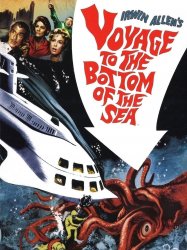 , 1h40
, 1h40Directed by Irwin Allen
Origin USA
Genres Drama, Science fiction, Adventure
Themes La fin du monde, Seafaring films, Transport films, Underwater action films, Submarine films, Children's films, Arme nucléaire, Disaster films, American disaster films, Films about seafaring accidents or incidents
Actors Walter Pidgeon, Joan Fontaine, Barbara Eden, Peter Lorre, Robert Sterling, Michael Ansara
Roles Dr. Susan Hiller
Rating59%





The new, state of the art nuclear submarine Seaview is on diving trials in the Arctic Ocean. The Seaview is designed and built by scientist and engineering genius Admiral Harriman Nelson (USN-Ret) (Walter Pidgeon). Captain Lee Crane (Robert Sterling) is the Seaview's Commanding Officer. One of the on-board observers is Dr. Susan Hiller (Joan Fontaine), studying crew-related stress. The mission includes being out of radio contact for 96 hours while under the Arctic ice cap, but the ice begins to crack and melt, with boulder-size pieces crashing into the ocean around the submarine. Surfacing, they discover fire burning in the sky. After the rescue of a scientist and his dog at Ice Floe Delta, Miguel Alvarez (Michael Ansara), the sub receives radio contact from Mission Director Inspector Bergan at the Bureau of Marine Exploration. He advises that a meteor shower pierced the Van Allen radiation belt causing it to catch fire, resulting in a world-threatening increase in heat all across the Earth. Nelson's on-board friend and scientist, retired Commodore Lucius Emery (Peter Lorre) concurs that it is possible. Bergan informs Nelson that the President wants him at a UN Emergency Scientific Meeting as soon as possible.

The Sinister Urge (1960)
, 1h11Directed by Ed Wood
Origin USA
Genres Drama, Thriller, Crime
Themes Films about music and musicians, Serial killer films, Musical films
Actors Kenne Duncan, Duke Moore, Harvey B. Dunn, Joan Fontaine, Reed Howes, Ed Wood
Rating26%





The film revolves around a series of murders of young women. The opening scene features an unnamed blonde woman (Betty Boatner) running along a mountain road, wearing only her undergarments. She is clearly scared for her life. She enters a city park and manages to reach a telephone booth. Her attempt to escape her assailant ends in failure, when the man also reaches the booth. He quickly kills her and leaves her corpse next to a lake. The corpse is soon discovered by visitors of the park. The scene shifts to a police station, where Police Lieutenant Matt Carson (Kenne Duncan) receives a phone report on the latest murder. He instructs subordinate Officer Kline (Fred Mason) to gather information from the witnesses who called in the discovery of the body. Then he summons his associate Sergeant Randy Stone (Duke Moore) and they head out towards the crime scene. They take note of the youthful appearance of the victim and suspect a connection to the "smut picture racket".

A Certain Smile (1958)
, 1h44Directed by Jean Negulesco
Origin USA
Genres Drama, Comedy-drama, Romance
Themes La provence, Children's films
Actors Rossano Brazzi, Joan Fontaine, Christine Carrère, Bradford Dillman, Eduard Franz, Katherine Locke
Roles Françoise Ferrand
Rating57%





In Paris, beautiful Dominique Vallon is involved with a young man, Bertrand Griot, until suddenly entering into an unwise week-long romance with his wealthy and married uncle, Luc Ferrand.

South Pacific (1958)
, 2h51Directed by Joshua Logan
Origin USA
Genres War, Musical, Romance
Themes Seafaring films, Films about music and musicians, Transport films, Musical films, Political films, Films based on plays, Films based on musicals, Children's films, United States Armed Forces in films
Actors Rossano Brazzi, Mitzi Gaynor, John Kerr, Juanita Hall, France Nuyen, Ray Walston
Roles Polynesian Woman
Rating67%





En 1943, sur une île du Pacifique, Nellie, une infirmière américaine, s'éprend d'un planteur français, Emile de Becque, qui a quitté son pays parce qu'il était accusé de meurtre. Mais elle accepte mal le fait qu'il ait déjà deux enfants, nés de son union avec une Polynésienne. Pendant ce temps, le lieutenant Cable tombe amoureux de la jeune Liat, fille d'une commerçante, mais refuse de l'épouser en raison de sa couleur de peau. Une mission à haut risque viendra bouleverser le destin de ces deux couples.

Until They Sail (1957)
, 1h30Directed by Robert Wise
Origin USA
Genres Drama, War, Romance
Themes Seafaring films, Transport films, Political films
Actors Jean Simmons, Joan Fontaine, Paul Newman, Piper Laurie, Charles Drake, Sandra Dee
Roles Anne Leslie
Rating64%





The film opens in a Wellington courtroom, where testimony prompts Barbara Leslie (Jean Simmons) to flash back to the events that led to the trial. She and her sisters Anne (Joan Fontaine), Evelyn (Sandra Dee), and Delia (Piper Laurie) live in Christchurch, where most of the male residents, including their brother Kit and Barbara's new husband Mark, are preparing to leave for World War II duty. Delia announces her engagement to Phil Friskett (Wally Cassell), known as "Shiner", who is one of the city's few remaining bachelors, but word of Kit's death dampens the celebration. Repressed and judgmental spinster sister Anne disapproves of the upcoming nuptials, but Barbara defends Delia's decision.

Island in the Sun (1957)
, 2hDirected by Robert Rossen
Origin USA
Genres Drama, Romance
Themes Seafaring films, Transport films, Children's films
Actors James Mason, Harry Belafonte, Joan Fontaine, Joan Collins, Dorothy Dandridge, Michael Rennie
Roles Mavis Norman
Rating61%





The film follows several characters, black, white as well as mixed. Maxwell Fleury (James Mason) is a white plantation owner's son who suffers from an inferiority complex and makes rash decisions to prove his worth. Maxwell is tormented by jealousy of his wife, Sylvia (Patricia Owens) and is envious of his younger sister Jocelyn (Joan Collins), who is being courted by the Oxford-bound Euan Templeton (Stephen Boyd), a war hero visiting the Governor of the island, his father Lord Templeton (Ronald Squire).

Beyond a Reasonable Doubt (1956)
, 1h20Directed by Fritz Lang
Origin USA
Genres Drama, Crime
Themes Films about writers, Films about journalists, Prison films, Films about capital punishment
Actors Dana Andrews, Joan Fontaine, Barbara Nichols, Sidney Blackmer, Philip Bourneuf, Arthur Franz
Roles Susan Spencer
Rating68%





Austin Spencer (Sidney Blackmer), a newspaper publisher, wants to prove a point about the inadequacy of circumstantial evidence. He talks his son-in-law, Tom Garrett (Dana Andrews), into participating in a hoax, in an attempt to expose the ineptitude of the city's hard-line district attorney. The plan is for Tom to plant clues which will lead to his arrest for the murder of a female nightclub dancer, Patty Gray. Once Tom is found guilty, Spencer is to reveal the setup and humiliate the District Attorney.
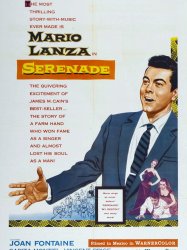
Serenade (1956)
, 2h1Directed by Anthony Mann
Origin USA
Genres Drama, Musical theatre, Musical, Romance
Themes Films about music and musicians, Musical films
Actors Joan Fontaine, Sara Montiel, Vincent Price, Joseph Calleia, Vince Edwards, Harry Bellaver
Roles Kendall Hale
Rating58%





Serenade tells the story of poor vineyard worker Damon Vincenti (Mario Lanza), who becomes an operatic tenor, and is involved with two women — one a high society hostess, the other a Mexican bullfighter's daughter, Juana Montes (Sara Montiel). Highly melodramatic, the film features a great deal of operatic music, all of it sung by Lanza. Of note are the Act III Monologue from Verdi's Otello and an extract from the duet "Dio Ti Giocondi" from the same opera featuring Metropolitan Opera soprano Licia Albanese. Reviewing the film in The New York Times, A.H. Weiler wrote that, "Mr. Lanza, who was never in better voice, makes this a full and sometimes impressive musical entertainment.
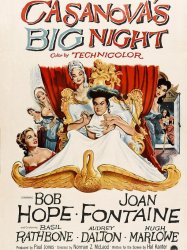
Casanova's Big Night (1954)
, 1h26Directed by Norman Z. McLeod
Origin USA
Genres Comedy, Musical theatre, Adventure, Musical
Themes Films about music and musicians, Musical films
Actors Bob Hope, Joan Fontaine, Basil Rathbone, John Carradine, Lon Chaney, Jr., Raymond Burr
Roles Francesca Bruni
Rating66%





Pippo, a tailor, impersonates Casanova to woo the girls, particularly the widow Bruni. Casanova has left town, pursued by creditors who persuade Pippo to impersonate Casanova at the behest of a Genoan family that will pay "Casanova" to test the fidelity of the son's betrothed.

The Bigamist (1953)
, 1h20Directed by Ida Lupino
Origin USA
Genres Drama, Romance
Themes Films about marriage
Actors Joan Fontaine, Ida Lupino, Edmond O'Brien, Edmund Gwenn, Kenneth Tobey, Jane Darwell
Roles Eve Graham
Rating67%





Harry (Edmond O'Brien) and Eve Graham (Joan Fontaine) want to adopt a child, as Eve is infertile. Adoption agent Mr Jordan (Edmund Gwenn) warns the couple that he would need to investigate them thoroughly. Harry looks curiously at Jordan, something that worries Jordan.
 Connection
Connection





